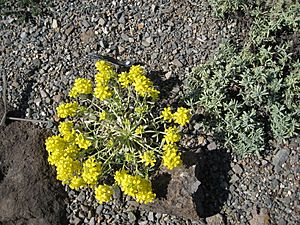Common twinpod facts for kids
Quick facts for kids Common twinpod |
|
|---|---|
 |
|
| Conservation status | |
| Scientific classification |
|
| Kingdom: | Plantae |
| Clade: | Tracheophytes |
| Clade: | Angiosperms |
| Clade: | Eudicots |
| Clade: | Rosids |
| Order: | Brassicales |
| Family: | Brassicaceae |
| Genus: | Physaria |
| Species: |
P. didymocarpa
|
| Binomial name | |
| Physaria didymocarpa |
|
| Script error: The function "autoWithCaption" does not exist. | |
Script error: No such module "Check for conflicting parameters".
Physaria didymocarpa, also known as the common twinpod, is a type of flowering plant. It belongs to the mustard family, just like the mustard plants you might know! This plant grows naturally in western North America. You can find it in places like British Columbia and Alberta in Canada, and also in the northwestern parts of the United States.
Contents
Discovering the Common Twinpod Plant
What Does the Common Twinpod Look Like?
The common twinpod is a perennial herb, which means it lives for more than two years. It grows several stems that usually lie on the ground but have tips that point upwards. These stems grow from a thick, hairy base called a caudex.
The stems are about 10 centimetres (3.9 in) (4 inches) long. They have leaves shaped like a spear, measuring one to two centimeters (about half an inch) long.
At the ends of the stems, you'll find groups of bright yellow flowers. These flower clusters are very dense. Each flower has petals that are about one centimeter (less than half an inch) long.
The Unique Fruit of the Twinpod
After the flowers bloom, the plant produces a special kind of fruit. This fruit is called a silicle. It's like a small, inflated pod, up to 2 centimetres (0.79 in) (0.8 inches) long and 2 centimetres (0.79 in) (0.8 inches) wide. The fruit can feel firm or papery, and it has a fuzzy texture.
Different Types of Common Twinpod
There are three main types, or subspecies, of the common twinpod plant:
 | Emma Amos |
 | Edward Mitchell Bannister |
 | Larry D. Alexander |
 | Ernie Barnes |


